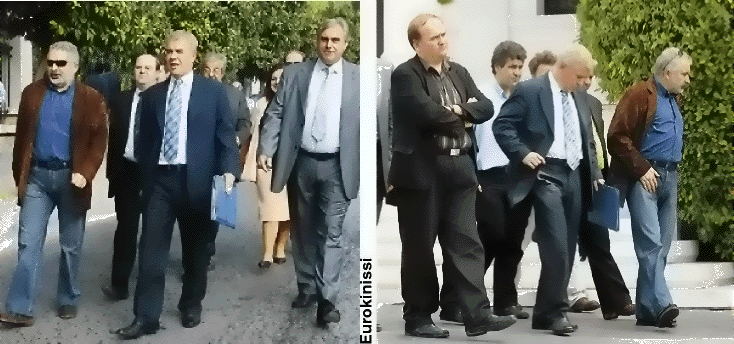The meeting with Costas Karamanlis was attended by unionists representing public primary and secondary school teachers. Marietta Yannakou, the education minister, was also at the negotiating table.
"As the prime minister, I have a responsibility to the economy," Karamanlis told reporters after his two-hour talk with the teachers. "I don't have the right to mortgage the country's future to win instant popularity."
Public school teachers' base pay is currently between 900 and 950 euros. They want at least 1,400 euros.
"I explained to the teachers, with every bit of honesty, that the economy cannot afford to satisfy their [pay] demand this year," said Karamanlis. "There are no winners and losers... We must all act responsibly."
Though the teachers' demand for higher wages was not met, Karamanlis did pledge to gradually increase their salaries over a five-year period.
Unionists, however, said their meeting with Karamanlis failed to achieve a breakthrough to end the strike which has kept students at home for six weeks. Dimitris Bratis, the president of the primary school teachers' union (DOE), told reporters that the meeting was held "in a good climate", but that it did not resolve their dispute.
"The fact that the prime minister agreed to meet with us is very positive," said Bratis. "But that's all. There is no substantial change in government proposals."
DOE unionists met on October 25 to discuss whether to continue their strike or return to their classrooms. Bratis said a final decision would be announced on October 27. In a written statement published on October 25, DOE's governing body said that the strike action must continue. "There is no other road to take," said the statement.
Bratis and Dimitris Georgas, the ruling New Democracy-affiliated president of the Greek Union of Secondary School Teachers (OLME), had originally declared that teachers would not end their strike until the government agrees to nearly double their salary. This is what Bratis told reporters on October 17 after meeting with Marietta Yannakou, who also insists that the government cannot increase their pay.
School spending
Karamanlis told teachers that his government has earmarked a whopping 3.3 billion euros of European Union funding. He called on them to present the education ministry with proposals about how to spend this money.
"I asked the teachers to table their proposals," said Karamanlis. "Not even a penny should be wasted."
As for the percentage of the country's gross domestic product (GDP) allocated to education - currently 3.67 percent - Karamanlis admitted that the 5 percent mark will not be reached next year. This was one of New Democracy's 2004 pre-election promises.
In an effort to make up for his decision not to increase teachers' base pay, Karamanlis did agree to pay each public school teacher in Greece a one-off benefit of 105 euros in four installments instead of six. It will be deposited twice in 2007 and once in 2008 and 2009. This benefit was first promised to teachers in 2002.
Karamanlis announced plans to offer grants of up to 20,000 euros to 2,000 public school teachers to conduct research.
"I also proposed to the teachers that we should meet every year before the start of the new academic year," said Karamanlis. "Dialogue is the foundation for a relationship based on trust... Improving public school education is a common goal."
Another promise from Karamanlis was that the education ministry will table new legislation by the end of this year making one year of preschool education mandatory.
Teachers rally
Hundreds of public primary and secondary school teachers took to the streets of downtown Athens and Thessaloniki on October 25 in what many believed to be the last demonstration before they return to their classrooms. University staff and students' unions also participated in the rally to show their support and to protest against the government's controversial university education reform proposals.
Meanwhile, the unrest has been compounded by a student takeover of more than 800 public secondary schools around the country. This is part of a broader protest against the government's education reforms. They want the government to abolish a new regulation that denies secondary school graduates entrance to public universities and colleges if they do not score an average of 10 out of 20 in their final examination.
As for professors and students at Greek universities, they are currently mobilising against the government's plans to allow the operation of private nonprofit universities. This would require a constitutional amendment and would come into effect after 2008.
Last week, the government and the main opposition socialist Pasok party agreed to postpone until next year a parliamentary debate on the amendment initially scheduled for October 25.
Opposition parties
Separate statements issued by the Communist Party of Greece (KKE) and the Coalition of the Left (Synaspismos) called on the government to satisfy the teachers' demands. KKE said that the demands are "fair and realistic". Synaspismos' political secretary, Alekos Falmbouraris, blasted Karamanlis for not finding a solution.
Pasok party spokesman Nikos Athanassakis blamed the conservative government for failing to bring teachers back to the classrooms. As for education in general, Athanassakis said that spending has been systematically cut ever since New Democracy came to power.
(Additional reporting from ANA and AP)


